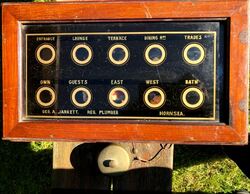
May 2019
Servant / Butler’s Bell Push
During the Georgian, Regency and Victorian eras (mid 18th and 19th centuries), anyone who wanted to represent themselves as having an air of middle-class respectability, employed domestic help. Servants, butlers and housekeepers had a crucial role to play in the daily running of households in these eras. These staff were responsible for numerous labour tasks such as heating, cooking, laundry, fetching and carrying – requiring lots of movement around the house, and lots of work.
In order to be able to communicate efficiently with the domestic staff, internal bell systems became very popular when they were invented in 1744. Prior to this invention, servants would have to wait outside their employer’s rooms or linger unassumingly in the background of the family quarters, waiting for orders. This was considered intrusive and inefficient. The innovate bell systems therefore increased privacy and meant that servants could remain in their quarters whilst waiting to be summoned.
The example here was from the home of Mr Robert Hobson of Hornsea, a local plumber who lived on Cliff Road.
Servant / Butler’s Bell Push
During the Georgian, Regency and Victorian eras (mid 18th and 19th centuries), anyone who wanted to represent themselves as having an air of middle-class respectability, employed domestic help. Servants, butlers and housekeepers had a crucial role to play in the daily running of households in these eras. These staff were responsible for numerous labour tasks such as heating, cooking, laundry, fetching and carrying – requiring lots of movement around the house, and lots of work.
In order to be able to communicate efficiently with the domestic staff, internal bell systems became very popular when they were invented in 1744. Prior to this invention, servants would have to wait outside their employer’s rooms or linger unassumingly in the background of the family quarters, waiting for orders. This was considered intrusive and inefficient. The innovate bell systems therefore increased privacy and meant that servants could remain in their quarters whilst waiting to be summoned.
The example here was from the home of Mr Robert Hobson of Hornsea, a local plumber who lived on Cliff Road.

